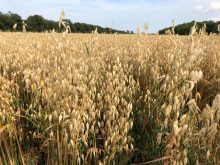Celiac sufferers needing foods free of gluten will now be able to get certain oat products with a “gluten-free” claim.
Federal Health Minister Rona Ambrose on Friday announced the allowed claim for oat products that are produced and processed to avoid cross-contamination by gluten from other cereals’ grains and products.
Celiac disease, a hereditary condition, causes the immune system to react negatively to dietary gluten, damaging the inner lining of the small intestine, thus hindering nutrient absorption.
“Normal agricultural practices” and food processing can lead to unintended presence of small amounts of gluten from other grains in oat products, Health Canada said.
Read Also

Wheat breeding system no longer works, Canadian Wheat Research Coalition report says
A Canadian Wheat Research Coalition report, published Feb. 26, says the status quo is not an option for Canada’s wheat breeding system. It must be transformed, by farmers.
However, the department on Friday cited “current scientific evidence” showing the majority of people with celiac disease may safely eat specially produced oats that contain no more than 20 parts per million (ppm) of gluten from wheat, rye, barley or hybridized strains of those grains.
“By allowing a gluten-free claim on specially produced oats and foods that contain them, consumers with gluten sensitivities will be better able to identify products they can safely eat,” Ambrose said.
The allowed claim requires that “gluten-free oats” be clearly identified as such in all cases where ‘oats’ are referenced, including in the list of ingredients.
Identifying the specially produced oats as “gluten-free oats” is expected to help make sure people with celiac disease don’t think all oats are safe for them to consume, thus helping to prevent “accidental consumption” of regular oats.
“Variety”
For oat growers and processors, the allowed labelling change is expected to open a new segment of the market to Canadian oat growers and food processors.
“Oats are a nutritious grain and can add variety for those who must follow a strict gluten-free diet for life,” Canadian Celiac Association president Anne Wraggett said in Health Canada’s release.
“The term ‘gluten-free oats’ on labels will make it much easier for the gluten-free consumer to identify products that they can safely eat.”
Health Canada had accepted since 2007 that most people with celiac disease could handle “limited amounts” of oats uncontaminated with wheat, barley or rye, and such oats could be “nutritionally beneficial” to celiac sufferers able to tolerate them.
The department had recommended “limited amounts” of 50 to 75 grams of oats per day for adults with celiac disease, and 20-25 grams for children.
However, a literature review last year led the department to conclude there’s no basis to recommend that people with celiac disease limit their consumption of specially produced oats.
The U.S. Food and Drug Administration has allowed “gluten-free” claims on oats at less than 20 ppm of gluten since 2013. — AGCanada.com Network
















